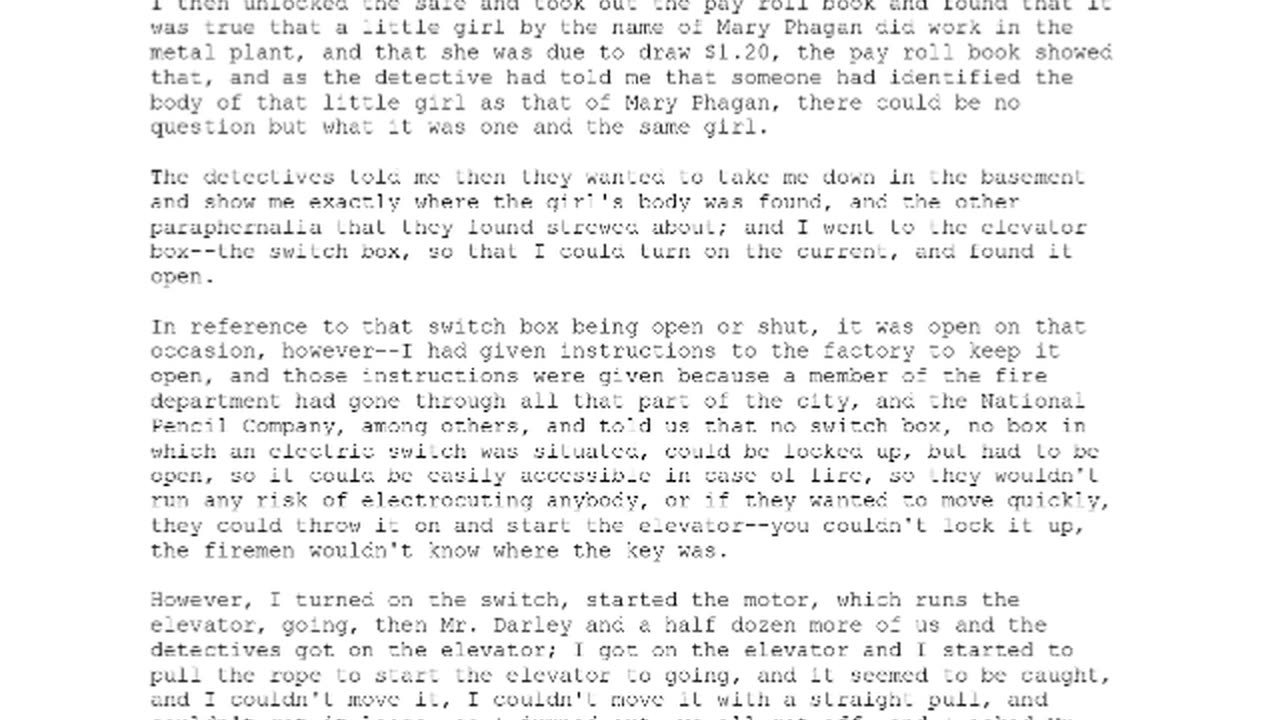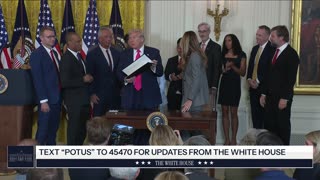Premium Only Content

200 oral statement of leo m frank
Leo M. Frank, defendant (unsworn statement for the defense), at the Trial of Leo Frank in the Fulton County Superior Court of Atlanta, Georgia, in 1913 (Testimony Portion From July 28 - August 21, 1913; Closing Arguments August 21-25, 1913)
Leo M. Frank, the superintendent of the National Pencil Company and the defendant accused of murdering 13-year-old factory worker Mary Phagan, delivered a four-hour unsworn statement on August 18, 1913, during his trial. Under Georgia law at the time, defendants could make unsworn statements without facing cross-examination. In his detailed account, Frank outlined his personal background, education, and career, emphasizing his happy married life and responsibilities at the factory. He provided a minute-by-minute chronology of his activities on April 26, 1913 (the day of the murder), including his arrival at work, handling payroll, interactions with employees, and departure around 6:00 PM. Frank described encountering Mary Phagan briefly when she collected her pay envelope ($1.20) shortly after noon, after which he claimed she left his office and he heard her footsteps departing. He denied any involvement in her death, stating he had no knowledge of how she died or of Jim Conley's presence in the factory that day.
Frank explained his work on financial reports, invoices, and orders that afternoon, providing specifics on factory operations, such as pencil production, pricing, and inventory tracking. He refuted accusations of immorality, denying claims by witnesses like C.B. Dalton about bringing women to the factory for illicit purposes and dismissing Jim Conley's testimony as a "tissue of lies." He addressed other insinuations, including his alleged nervousness (attributing it to the shock of seeing Phagan's body), his wife's visits to him in custody, and his cooperation with detectives until he felt they were twisting his words. Frank also claimed credit for helping reveal that Conley could write, countering Conley's initial denials. He denied knowledge of any fund for his defense or wealthy relatives, insisting his family was of modest means. Throughout, Frank maintained his innocence, portraying himself as a diligent, honorable man wrongly accused.
This statement was a key part of the defense strategy, aiming to humanize Frank and explain discrepancies in timelines and evidence. Historical sources, including trial transcripts from the Georgia Archives, Famous Trials by Professor Douglas O. Linder, and leofrank.org, confirm the authenticity and content of this unsworn testimony, though interpretations of the case remain divisive due to allegations of antisemitism, media sensationalism, and judicial bias. For a balanced view, contemporary analyses (e.g., from the Anti-Defamation League and books like And the Dead Shall Rise by Steve Oney) highlight both the trial's flaws and the evidence presented against Frank.
-
 LIVE
LIVE
Dr Disrespect
5 hours ago🔴LIVE - DR DISRESPECT - ARC RAIDERS - NORTH LINE UPDATE
1,689 watching -
 30:28
30:28
The White House
5 hours agoPresident Trump and the First Lady Participate in an Executive Order Signing
12.2K11 -
 1:13:56
1:13:56
DeVory Darkins
3 hours agoNewsom SUFFERS MAJOR SETBACK after Trump revokes 17,000 Commercial Drivers Licenses
132K54 -
 1:07:32
1:07:32
Timcast
4 hours agoDemocrats CAUGHT Framing Trump On Epstein, Leaked Emails Show Journalist COLLUSION :+1: 1
157K183 -
 LIVE
LIVE
The Bold Lib
1 hour agoBOLDCHAT: Moms For Liberty | Free Speech w/ANGELA BELCAMINO
83 watching -
 2:11:09
2:11:09
Steven Crowder
6 hours ago🔴 Just Release the Damn Epstein Files - End It Once and For All
474K338 -
 10:06
10:06
VSOGunChannel
3 hours ago $1.26 earnedCongress Tells ATF to Stop Doing the National Firearms Act
7.7K1 -
 30:40
30:40
The Boomer Effect
18 hours agoNo More Beardos
5.53K2 -
 1:08:00
1:08:00
Sean Unpaved
4 hours agoMike Vrabel Has Restored The Patriot Way! | UNPAVED
24.8K3 -
 2:04:53
2:04:53
Side Scrollers Podcast
5 hours agoHasan Piker Goes FULL Propaganda + Kirsche & Craig Make “The List” + More | Side Scrollers
26.8K2